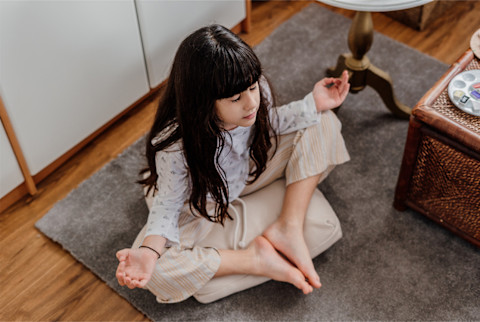5 Mindful Ideas To Help Your Kids Ground Down After School

As a parent, you know what it's like when your kid comes home from school all wound up and cranky. From the attitude to the emotional breakdowns that begin as soon as the carpool door opens, the after-school routine can be mentally and physically exhausting. Getting your child to respond to questions, wash up for dinner, or even think about homework is like pulling teeth. And don't get us started on bedtime...
Getting kids from school to bed is a full-on whirlwind, but pro-tips like making their sleeping area a place of ease and comfort with Brentwood Home's Juniper Kids' Mattress will make things more seamless. And for those of you receiving positive reviews from your child's teacher, wondering how they can be so well-behaved at school and a hot mess at home—you're not alone. It turns out there's a reason for what some professionals call "after-school restraint collapse," and there are things you can do to combat it.
After-school restraint collapse—what and why?
After a long day at school or day care, it's pretty common for kids to come home in a total funk. They may lash out, cry, throw things, or act generally unreasonable. For older kids, it may manifest more as rudeness or disrespect. This kind of behavior is so universal that London, Ontario-based counselor and parenting educator Andrea Nair dubbed it "after-school restraint collapse."

Kids experience this crash because they spend the whole day away from their parents/support system, learning challenging topics, sitting still for hours, learning social behavior, and becoming generally overstimulated. While they may find initial comfort in being back home in their safe environment, it is also the place where they can unleash their pent-up emotions—with parents becoming the ultimate targets. What's important to recognize is that your child is not purposefully trying to push your buttons. Rather, they are experiencing a literal emotional collapse. And as their parents, it's our job to learn how to help them navigate it.
Mindful exercises to help ground your kids.
The first line of defense is always a nutritious snack. Just like us, kids get hangry, so taking this factor out of this equation makes things a bit easier. It's also best to save any questions about school for later. With all that overstimulation and built-up emotion, you won't get the answers you're looking for. A better solution is to greet them with love and turn on some music so that they're given the time and space to decompress. Once home and fed, the following techniques will help to keep things moving in the right—and more Zen—direction:
1. Breathing exercises
As adults, we know that taking a moment to connect to the breath and body can help to relieve stress and lead to uninterrupted sleep at night. But new research suggests that the same is true for kids. Make it a habit to encourage some grounding breathwork as soon as you arrive home from school. Kids get bored easily, so keep it short and sweet at first—this five-minute exercise is a great place to start. And consider giving them their own special cushion for their practice, like the Brentwood Home Buckwheat Yoga Bolster Pillow. It's filled with all-natural buckwheat hulls and held by a 100% organic cotton liner—comfortable on the bum for a seated position and soft under the head for a flat savasana.
2. Yoga flow
Similar to breathwork, yoga can help kids ground down and redistribute their energy in a more active way. And it's a great way to bond with your mini-me while simultaneously squeezing in your own yoga flow—two birds, one stone! To get them started, we recommend this 12-minute flow, designed for kids of all ages, that makes yoga fun and easy. Maybe even take your parent-child yoga practice to the next level with matching Brentwood Home Organic Non-Slip Yoga Mats. They're made from 100% organic certified cotton and completely washable—aka completely kid-proof.
3. Nature walk
Nature walks are another great way to help your kids cool off and reconnect with their saner selves. Not only is movement beneficial for emotional release, but studies also show that spending time in nature can help mitigate stress and can also help prevent it in the first place [*1] [*]. PLUS, if the sun is shining, they'll get a dose of vitamin D, which provides its own benefits for emotional health2.
4. Dance party
For those with kiddos who can't seem to sit still, after-school dance parties are the solution for you. Research shows that dancing helps children both to manage emotions and to improve their adaptability in school. It's a particularly effective tool for children who suffer from emotional disorders and learning disabilities, increasing children's self-esteem, emotional expression, and ability to complete tasks.

5. Read a book
When it comes to the after-school routine, bedtime is often the most dreaded step. Temper tantrums and protesting become commonplace—but easing into things with storytime tends to be an aggregable way to wind down and bring kids into the present moment. Settling in on a cozy bed like Brentwood Home's Juniper Kids' Mattress will naturally encourage sleepy eyes and heavy heads as they drift into a fictional world. Formulated with up to 20% plant-based BioFoam, the Juniper mattress sleeps cooler than traditional memory foam, providing a hugging sensation that contours growing (and emotionally worked-up) bodies.
Juniper Kids Mattress

Implementing good, mindful habits.
As much as we love our little monsters, they can drive us a bit mad sometimes. Whether your child experiences after-school restraint collapse or comes home with a general excess of energy, establishing mindfulness practices as a part of a regular after-school routine can help to ground them down after a long school day. It takes time for anything to become a habit, but keeping consistent with the mindful techniques that work for your child may help lead to a more manageable and pleasurable after-school experience.

